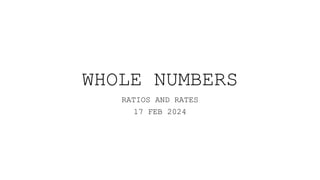Gr 8/9 Whole Numbers: RATIOS and RATES.pptx
- 1. WHOLE NUMBERS RATIOS AND RATES 17 FEB 2024
- 2. LESSON OBJECTIVES By the end of the lesson, learners should be able to: ?Compare two or more quantities of the same kind (ratio) ?Share in a given ratio where a whole is given ?Compare two or more quantities of different kind (rate)
- 3. PRE-KNOWLEDGE ? RATIO ? HIGHEST COMMON FACTOR
- 4. BASELINE ACTIVITY 1. Write the following ratios in their simplest form. a) 9 to 15 b) 12: 18: 30 2. Find the simplest form of the ratio 27 minutes to 1 1 2 hours.
- 5. TERMINOLOGY AND DEFINITIONS ? A ratio is a comparison between two quantities that have the same unit. A ratio of 3 : 5 (read as 3 to 5) ? A ratio divides a number into different parts. ? A ratio is also used to compare two or more quantities of the same type
- 6. Example 1 Lebo has 8 apples and Sarah has 12 apple. What is the ratio of LeboĪ»s apples to SarahĪ»s apples? Solution: We first find the HCF between 8 and 12 which is 4. Then we divide both by the HCF: 8 4 : 12 4 = 2: 3
- 7. Example 2 Thabang walks 2km to school and Sello walks 800m. Express the ratio of ThabangĪ»s distance to SelloĪ»s distance as a ratio, in its simplest form.
- 8. Example 2 Solution: First convert so that the units are the same: Thabang walks 2km, this is equivalent to 2000m Sello walks 800m HCF = 400 Divide by HCF: 2000 400 : 800 400 = 5: 2
- 9. Example 4: finding the missing number or quantity Simphiwe and Snazo run a relay race together. The ratio of the distance they each run is 3 : 5. If Simphiwe runs a distance of 900m. a) How many metres did Snazo run? b) What is the total distance of the race?
- 10. Example 4: finding the missing number or quantity Solutions a) Simphiwe ran a distance of 900m which represents 3 parts. ĪÓ 1 ???? = 900? 3 = 300? From the ratio we also know that Snazo ran 5 parts (3 : 5) Distance ran by Snazo = 300? Ī┴ 5 = 1 500?
- 11. Example 4: Dividing a number in a certain ratio Divide 72 into the ratio 3 : 4 : 5.
- 12. Example 4: Dividing a number in a certain ratio Solution Step 1: Add all the ratios 3 + 4 + 5 = 12 (total no. of parts) Step 2: Calculate one part One part: 72 12 = 6 Step 3: Multiply one part into the given ratio 3 Ī┴ 6: 4 Ī┴ 6: 5 Ī┴ 6 = 18: 24: 30
- 13. Example 4: finding the missing number or quantity Solutions b) To find total distance we first need to find the total number of parts. This is done by simply adding the two quantities in the ratio: 3 : 5 = 3 + 5 = 8 parts. 1 ???? = 300? ĪÓ 8 ????? ???? ?? = 8 Ī┴ 300? = 2 400? Therefore, the total distance of the race is 2 400 metres.
- 14. Example 5: dealing with decimals Express 0,2: 0,15 as a ratio between two whole numbers in its simplest form
- 15. Example 5: dealing with decimals Solution: Look at the number with the most decimal places, which is 0,15. To make this a whole number, we need to multiply by 100. Multiply both parts by 100: 0,2 Ī┴ 100: 0,15 Ī┴ 100 = 20: 15 Now find HCF : 5 Divide by HCF: 20 5 : 15 5 = 4: 3
- 16. ACTIVITY
















